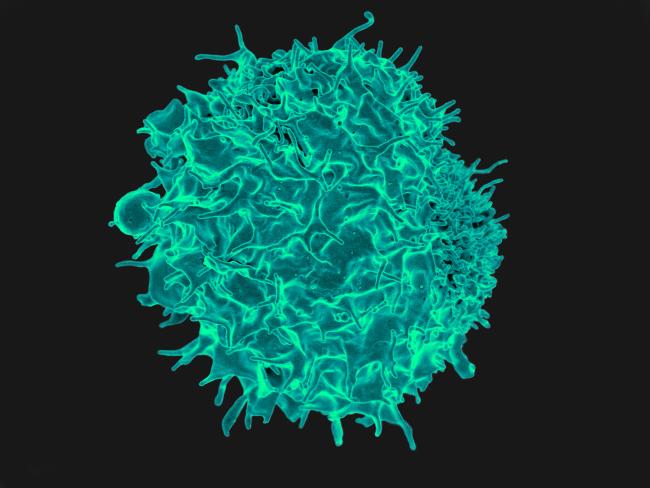Memory T cells shelter in bone marrow, boosting immunity in mice with restricted diets
Media Advisory Thursday, August 22, 2019
Memory T cells shelter in bone marrow, boosting immunity in mice with restricted diets
NIH findings suggest how immune system evolved to withstand food scarcity.

What
Even when taking in fewer calories and nutrients, humans and other mammals usually remain protected against infectious diseases they have already encountered. This may be because memory T cells, which are located throughout the body and required to maintain immune responses to infectious agents, according to scientists at the National Institute of Allergy and Infectious Diseases (NIAID), part of the National Institutes of Health. Their study in mice, published online today in Cell, also found that animals undergoing dietary restriction were better protected against tumors and bacterial infections than animals with unrestricted diets.
Researchers led by Yasmine Belkaid, Ph.D., chief of the Metaorganism Immunity Section in NIAID’s Division of Intramural Research, previously observed that fat tissue harbors memory T cells in mice. They investigated whether this phenomenon helped preserve immune memory when calorie intake was reduced. To investigate, they restricted the diet of mice previously given full access to food. While receiving less food, mice had fewer memory T cells in their lymphoid tissues, where they normally linger, and more of the T cells in bone marrow that became enriched with fat tissue.
Investigators then evaluated how well memory T cells performed when mice ate less. While eating freely, mice were infected with the bacterium Yersinia pseudotuberculosis. After the mice developed immunological memory, researchers restricted the diets of some of the mice for up to four weeks before again exposing all the mice to Y. pseudotuberculosis. Mice with restricted diets had more robust memory T cell responses and were better protected from illness. The researchers repeated this experiment using a vaccine that trains immune cells to fight melanomas and found that memory T cells were more protective against tumors in mice receiving less food.
Though this phenomenon has yet to be studied in humans, the findings suggest how the immune system may have evolved to help mammals survive periods of limited food availability while keeping their immunity intact. These results in lab animals cannot be extrapolated to dietary advice for people. However, these insights may one day help clinicians improve immunotherapy for cancers and other diseases by optimizing nutrition.
Article
N Collins et al. The bone marrow protects and optimizes immunological memory during dietary restriction. Cell DOI: 10.1016/j.cell.2019.07.049 (2019).
Who
Yasmine Belkaid, Ph.D., the lead author, director of the NIAID Microbiome Program and chief of the Metaorganism Immunity Section in the Laboratory of Immune System Biology of NIAID’s Division of Intramural Research, is available for comment.
Contact
To schedule interviews, please contact Judith Lavelle, (301) 402-1663, niaidnews@niaid.nih.gov.
This press release describes a basic research finding. Basic research increases our understanding of human behavior and biology, which is foundational to advancing new and better ways to prevent, diagnose, and treat disease. Science is an unpredictable and incremental process — each research advance builds on past discoveries, often in unexpected ways. Most clinical advances would not be possible without the knowledge of fundamental basic research.
NIAID conducts and supports research — at NIH, throughout the United States, and worldwide — to study the causes of infectious and immune-mediated diseases, and to develop better means of preventing, diagnosing and treating these illnesses. News releases, fact sheets and other NIAID-related materials are available on the NIAID website.
About the National Institutes of Health (NIH): NIH, the nation's medical research agency, includes 27 Institutes and Centers and is a component of the U.S. Department of Health and Human Services. NIH is the primary federal agency conducting and supporting basic, clinical, and translational medical research, and is investigating the causes, treatments, and cures for both common and rare diseases. For more information about NIH and its programs, visit www.nih.gov.
NIH…Turning Discovery Into Health®
Institute/Center
Contact
301-402-1663


